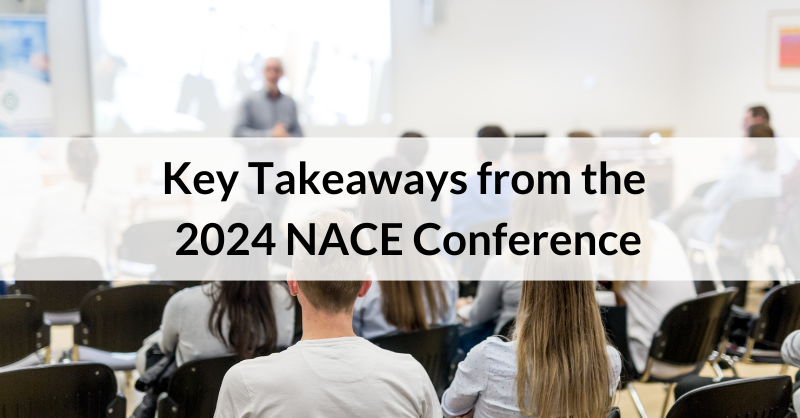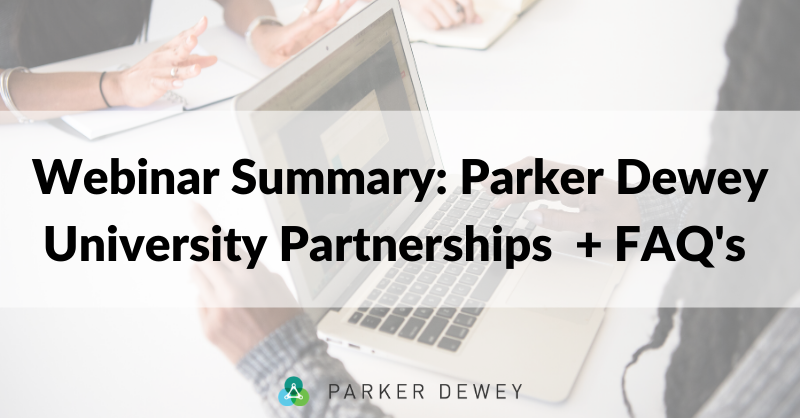
Key Takeaways from the 2024 NACE Conference
Last week, members of the Parker Dewey team joined the thousands of recruiters, career services professionals, and others invested in early-career student engagement at the annual National Association of College & Employers (NACE) conference. As always, this gathering was an incredible opportunity to hear from both stakeholders with interests that are aligned: how to best reach and engage students for early-career professional development opportunities.
Reflecting on the conference, several key themes stood out. Here are some of the most talked about insights from this year's event:
Building Real Connections
One of the prominent themes was the importance of building genuine connections with students. Students are eager to gain a "backstage perspective" on companies, wanting to understand what it’s like to work there beyond the usual job descriptions and corporate presentations. (We also heard this insight in our recent student survey.) This need for deeper engagement highlights the importance of transparency and authentic communication from employers.
Broadening Industry Perceptions
Employers from well-known or specialized industries, such as healthcare, are finding innovative ways to broaden students' perceptions of the roles available within their organizations. Many students might not realize that hospital systems hire beyond medical professionals or that tech firms need finance experts. Educating students about these diverse opportunities can help attract a wider talent pool.
Critical Offer to Start Process
The period between extending an offer and the start date is crucial. No matter how well the rest of the recruiting process is executed, poor management of this phase can negatively impact conversions and increase the risk of reneges. Ensuring a smooth and engaging transition during this time can help retain top talent.
Embracing Skills-Based Hiring
The benefits of skills-based hiring were emphasized, though many organizations are still figuring out how to implement this approach at scale. Focusing on specific skills rather than traditional qualifications can help in identifying the best candidates for the job, promoting a more inclusive hiring process for talent and a more efficient one for employers.
Data-Driven Recruiting
Data is becoming increasingly important in the recruiting process, but it needs to go beyond vanity metrics. Employers should focus on metrics that truly drive outcomes, providing insights into what works and what doesn’t. This data-driven approach helps in refining strategies and improving overall hiring effectiveness.
Middle of the Recruiting Funnel
The middle of the recruiting funnel, often neglected, was highlighted as a critical stage. While significant effort is spent on initial engagement and final selection, the middle stage is where relationships are built and mutual fit is assessed. Employers need to invest more time and resources here to ensure they are making the best hiring decisions.
Collaboration with Hiring Managers
Collaboration and buy-in from hiring managers are key to a successful recruiting process. Some organizations are even experimenting with removing hiring managers from parts of the process to streamline it, though this approach has its pros and cons. Effective collaboration can help in creating a more cohesive and efficient hiring strategy.
Major vs. Skills
A recurring theme was the idea that a college major does not necessarily equate to the skills or fit for a particular role. An English major might have the right core skills to excel in banking, or a chemistry major might turn out to be an incredible marketer. Employers are encouraged to look beyond majors and focus on the actual skills and potential of candidates.
AI in Recruiting
AI continues to be a hot topic in recruiting, with discussions around its benefits and limitations. While AI can significantly enhance the recruiting process by automating tasks and providing insights, it should not replace the human touch. It’s essential for students to understand and demonstrate their ability to use AI effectively.
TL;DR
By focusing on genuine connections, broadening industry perceptions, effective transition periods, skills-based hiring, data-driven strategies, middle-funnel investment, hiring manager collaboration, and the balanced use of AI, employers can enhance their recruiting efforts and better engage with the next generation of talent.


/Partnerships%20Newsletter/Parker%20Dewey%20Partner%20Content%20-%20December%202025.png)

.png)